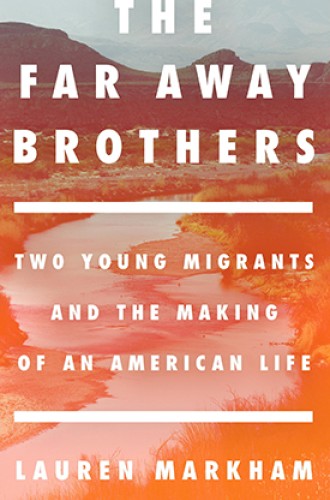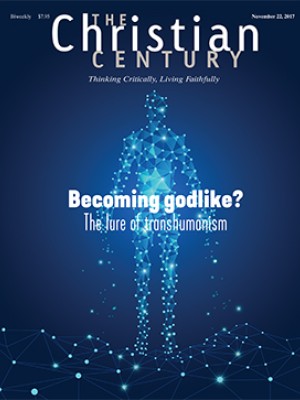Undocumented immigrants in their full humanity
Lauren Markham documents the bravery of two migrant brothers from El Salvador—and their mistakes, too.
As Ernesto and Raúl Flores, teenage twin brothers from El Salvador, attempted to cross into the United States, they found themselves lost in the desert on the northern side of the Rio Grande. Raúl’s shoes were falling apart.
“Here.” Ernesto yanked off his shoes and demanded Raúl do the same. “Take mine.”
Raúl obliged. Ernesto pulled Raúl’s shoes onto his own feet and undid the laces, winding them around the bottom of the soles to hold the halves together, then tied them as tightly as he could.
“Thanks,” Raúl said.
Ernesto made a face to make sure Raúl knew he was annoyed at him for letting this happen.
The Flores twins arrived in the United States from El Salvador in the summer of 2012, just before the wave of unaccompanied children coming from Central America crested. For years before they crossed the border, Ernesto dreamed of a life in the United States, where he hoped to be free of the violence and poverty that dogged his family. Raúl was less interested. He wanted his family to stay together in El Salvador. But when Ernesto left the country after a threat from the boys’ uncle and local gangs, Raúl followed him. Now the two had to find a way to make a life together.
Lauren Markham, a journalist who was also a teacher at the twins’ school in Oakland, California, recounts the boys’ journey and their attempts to establish themselves in a new country. Besides being robbed and having their lives threatened in the desert, Ernesto witnessed something about which he could not speak for years. It disturbed his sleep and drove him to alcohol and drugs.
Read our latest issue or browse back issues.
The boys were eventually apprehended at the border—a life-saving fact—and after some time in detention, they were put in the custody of their older brother Wilbur. Wilbur had been trying to make a life for himself in Oakland, while sending money back home. He was undocumented and worked long hours in landscaping. The Flores twins gave Wilbur not only two extra mouths to feed but also $16,000 in family debt owed to the smugglers who helped them get to the United States. This debt compounded daily while the brothers tried to go to school, learn English, and get part-time jobs.
Every step of their journey is fraught. The twins have a crucial meeting about applying for asylum at the courthouse in downtown San Francisco, but they cannot find the building. They drive in circles, swearing at each other until it is too late, and they go home. The debt expands. The boys pay rent and buy cell phones with what little wages they have. Their family in El Salvador thinks they are not trying hard enough. Many times, their journey feels like those shoes falling apart in the desert—the boys don’t have the right materials to meet the demands placed on them.
Readers live alongside the Flores twins and suffer with them, but Markham does not try to turn the brothers into martyrs, saints, or heroes. In many ways, the brothers are not the most sympathetic figures for a study of undocumented immigrants. They are teenage boys—not quite children, but definitely not adults—and many of the choices they make are just plain stupid. They struggle to apply themselves in school. They attempt relationships that seem unlikely to succeed. They always blame the wrong person for the difficulties that arise. And difficulties seem to multiply at the same rate as their debt. For example, Raúl loses his wallet which contains that month’s cash to send home. The boys are wounded and self-sabotaging. They put themselves in many no-win situations, but they also come from a no-win situation, outside of their control.
Markham befriended the boys in the context of her work at their school. Personal entanglements between a reporter and her subjects create a precarious situation, but Markham manages it better than some other writers. For example, Matthew Desmond’s Evicted and Katherine Boo’s Behind the Beautiful Forevers—both powerful books—do not treat the relationship between author and subject with the same forthrightness Markham does.
Markham functions as an empathetic intermediary amid ordinary and extraordinary struggles. She is implicated in the boys’ search for a livable life, but her closeness to the situation does not impede her analysis. Her closeness also serves as a proxy for readers. In reality, we are all implicated in the brothers’ lives. Their journey is the story of our nation. What they overcome might be what we also need to overcome.
In a recent op-ed article in the New York Times, Héctor Tobar writes that too often profiles of immigrants fail to grasp their full humanity. Images of the just-apprehended, the hunted, and the detained reflect only a small piece of immigrants’ experience. Tobar argues for art that captures “the beauty and complexity of the lives of working people seen as they truly are.” The Far Away Brothers exemplifies such art, telling a story of courage and failure, tenacity and loss, loyalty and fumbling steps into an unknown future.







